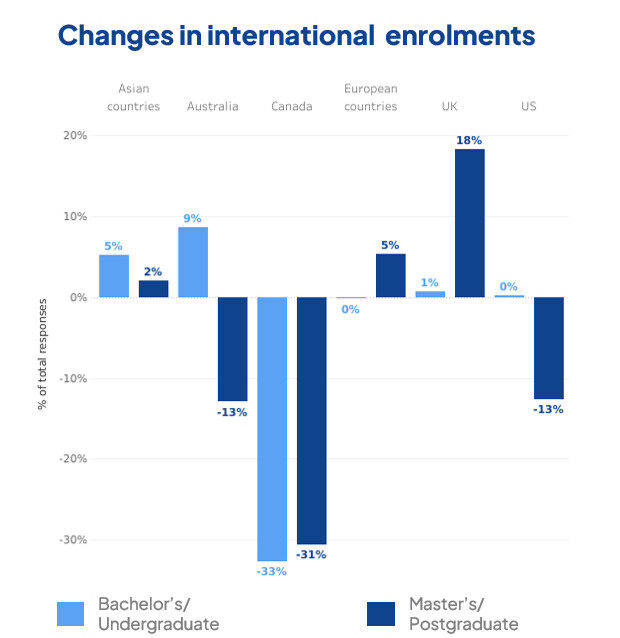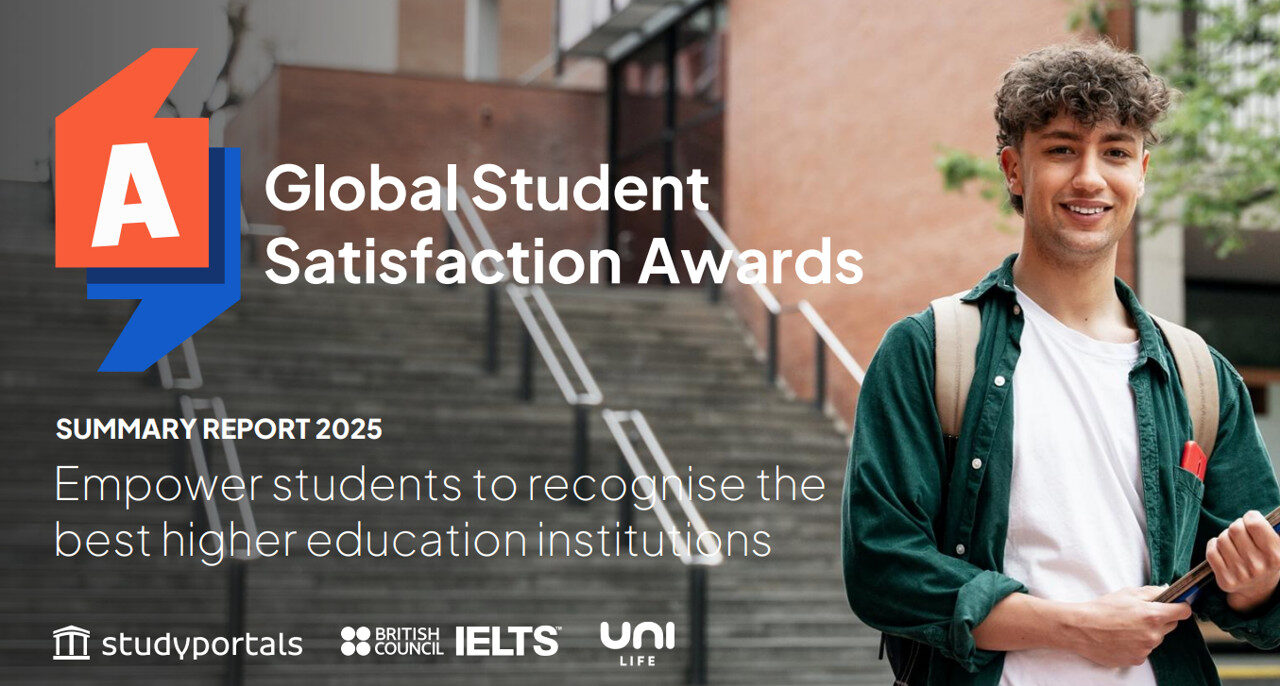International postgraduate students turning away from US, Canada and Australia, with the UK, Europe and Asia reaping the benefits

[ 6 May 2025] — Restrictive government policies and visa challenges are now the most significant barriers to international student enrolments globally. This is according to the latest edition of the Global Enrolment Benchmark Survey, conducted by Studyportals in collaboration with NAFSA: Association of International Educators and the Oxford Test of English.
62% of the 240 institutions surveyed find government policies on international students and/or problems obtaining a visa a significant issue for students to overcome to enrol. This includes 93% of universities surveyed in Canada, 86% of universities in Australia, and 70% of those in the US. That contrasts with just 6% of responding institutions in Asian countries that feel that this issue is significant. This is a change from the last intake, where just half of institutions surveyed cited it as a significant issue — second to affording tuition and cost of living.
Universities across the globe mentioned visa costs and delays, migration limitations and policy uncertainty as major obstacles. They also spoke to the lack of consultation, and the disruptive manner in which government policies were rolled out.
Featuring responses from institutions across 48 countries the findings reveal mixed trends for the January to March 2025 academic intake — a crucial period that accounts for 32% of global Bachelor’s and Master’s programme start dates.
Diverging enrolment trends across different parts of the world
See the figure below for regional insights into international student enrolments compared to the same intake last year, as reported by participating institutions.
For Undergraduate enrolments 26% of institutions surveyed reported a decline in enrolments, while 40% saw enrolments staying at the same level as last year’s intake. 34% saw growth in enrolments.
For Postgraduate enrolments, 34% of institutions reported a decline, 37% remained stable, and 29% experienced growth.

Key obstacles to student enrolment
- Restrictive government policies and/or problems obtaining a visa: 62% of institutions surveyed view these as a significant issue for students to overcome to enrol. This includes 93% of universities surveyed in Canada, 86% of universities in Australia, and 70% of those in the US.
- Cost of living and tuition fees: these remain a significant concern for institutions globally (46%), with particular emphasis in the UK, where 57% of institutions cited this as a top challenge.
- Meeting academic admissions requirements: 15% of all responding institutions and 41% of institutions in Asian countries indicate that this is a significant issue.
- Meeting English proficiency requirements: Consistent with the findings of the 2024 survey, one in ten institutions view this as a significant issue
What institutions are anticipating over the next 12 months
- Budget cuts: 67% of Canadian institutions view them as very likely over the next 12 months (compared to 38% of institutions globally), as well as 64% of institutions in Australia and 57% in the UK.
- Large changes to subjects/programmes: 17% of all institutions expect this in the next 12 months. The UK and Canada have the highest proportion of institutions that anticipate these changes (48% and 33% respectively)
- Diversification into new markets remains the most universally anticipated strategy among the institutions.
Fanta Aw, Executive Director and CEO of NAFSA: Association of International Educators says:
“Amid sweeping political shifts in the United States, this survey offers a powerful snapshot of how policy turbulence is reshaping global student mobility. The message is unmistakable: international students are paying attention—and increasingly turning away from the traditional ‘Big Four’ destinations in search of stability, opportunity, and affordability. It is really about the “Big Ten” now. If higher education leaders and policymakers fail to act, they risk losing not just talent, but also the innovation, research, and economic vitality that international students generate.”
Sara Pierson OBE, Managing Director English Assessment, Oxford University Press says:
“The continuation of this ground-breaking initiative to capture real-time data on international enrolments highlights the sector’s prevailing need to remain agile in an increasingly volatile landscape. With uncertainty in student mobility patterns, enabling institutions to access current data is crucial for informed decision-making. Diversification into new markets remains the most universally anticipated strategy, and meeting English proficiency is a significant issue for 1 in 10 institutions worldwide, which is consistent with the 2024 survey. This data underscores the importance of our work at the Oxford Test of English in supporting institutions and enabling opportunities for English language learners globally.”
Edwin van Rest, CEO and Co-founder of Studyportals says:
“The global market for academic talent is as dynamic and complex as it has ever been, this poses unique challenges and uncertainties for students and universities in the traditionally largest destinations. International students have proven to be of broad and unique contribution to their host countries, and some upcoming destinations are effectively making use of the current market situation to advance talent attraction .”
About the Global Enrolment Benchmark Survey
The Global Enrolment Benchmark aims to illuminate one of the sector’s largest blind spots through peer-sourced data. For the first time, institutions can see how they measure up not just against domestic peers, but against a truly global benchmark.
This survey brings transparency to the sector, empowering institutions to track the impact of policies and market trends on international student demand.
About NAFSA: Association of International Educators
NAFSA is the world’s largest and most comprehensive nonprofit association dedicated to international education and exchange. NAFSA promotes policies that ensure the continued growth and impact of global learning, cultural exchange, and mutual understanding through study abroad, international student services, and campus internationalization.
About Oxford Test of English
The Oxford Test of English, Oxford Test of English Advanced and Oxford Test of English for Schools have been developed by Oxford University Press (OUP) and endorsed by the University of Oxford. They have undergone years of research, rigor, and quality assurance to ensure they meet the highest standards in English language assessment and join a suite of renowned learning resources published by OUP which empower English language learners across the world.
About Studyportals
Studyportals is the world’s most comprehensive study choice platform, helping students to choose their best-fit study across 245,000+ English-taught programmes from 3,500+ institutions in 118 countries. Over 51 million students use Studyportals platforms annually to find and compare their study options across borders and select the right programme. Our goal is to make education choice transparent, globally.
Based on the search and choice behaviour of millions of students, our Analytics and Consulting team provide real-time, forward looking market insights on student interest, institutional offering, pricing, student success, graduate outcomes and the changes in the competitive landscape for international education.
Press Contact:
Studyportals: Cara Skikne
caraskikne@studyportals.com


